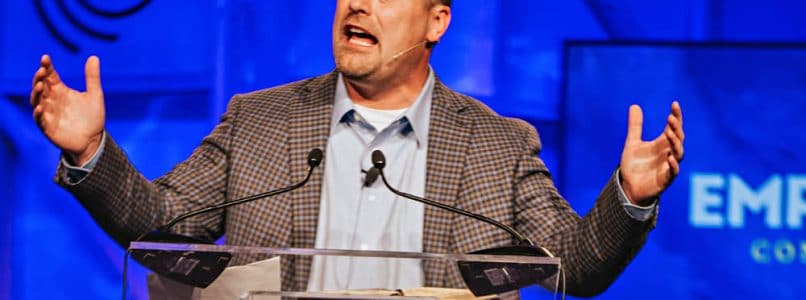MARSHALL What do you do with 1,100 residential college students stranded on campus without water? This unwelcome problem confronted East Texas Baptist University President Blair Blackburn, faculty and staff in the wake of Winter Storm Uri, which left the university high and dry for days in February till water came from unexpected sources.
“We were down to one spigot,” Blackburn told the TEXAN. Some students had left but most stayed on campus, unable to leave because of road conditions, limited gasoline supply and the fact that the situation at home was worse than what they faced at school. The campus never lost power and experienced only a brief internet outage, but the city water supply failed. Staff and students filled bathtubs of snow to melt and buckets of water till the last spigot faltered. The college was without city water for more than seven days. Even after water was finally restored, the campus remained under a boil water notice till Feb. 26.
“We cried out to God for provision and the wisdom to solve the water crisis,” Blackburn said. University staff also drove to area stores to secure as much water as possible. But supply was low.
A call from Clay Jones, missions minister at Beaumont’s Calvary Baptist Church, to Scottie Stice, SBTC DR director, started things rolling. Jones, whose daughters attend ETBU, told Stice of the university’s plight. Stice contacted Ryan Erwin, ETBU vice president for student engagement to offer the convention’s assistance.
“It all came together in about an hour and a half,” Stice said of the relief effort which involved a series of phone calls and emails, beginning with Jones’ call. Gaylon Moss, Missouri Baptist DR director, contacted Stice with offers of bottled water and other assistance. Meanwhile, Sandy Wisdom-Martin, executive director of the national Woman’s Missionary Union, had emailed Jim Richards, SBTC executive director, to offer help for Texas. Richards connected her to Stice, who coordinated contact between Missouri DR and the WMU.
Gospel cooperation
Bolstered by extra funds from Missouri Baptist churches and the promise of assistance from the WMU, Moss directed Missouri Baptist DR to transport 10 pallets of bottled water to ETBU, 19 pallets to the Diboll, Texas fire department for distribution in Angelina and surrounding counties, and 10 pallets to the Fannin Baptist association for the Bonham area.
“We’re grateful to our partners Missouri Baptist churches and the WMU for their generous donations to help with this Texas weather relief,” Moss said.
“When people in Texas are suffering with lack of clean drinking water, of course WMU would want to help. It is our privilege to partner with Missouri Baptists and the SBTC to provide resources through a Pure Water, Pure Love grant. Our hope is people will gain access to physical water to keep them healthy, but also the living water leading to faith in Christ,” Wisdom-Martin told the TEXAN.
SBTC Executive Director Richards said, “I am thankful to the national WMU for the provision of water made through SBTC Disaster Relief in conjunction with Missouri Baptist DR and Missouri churches in the recent weather event. We are blessed by such gospel cooperation to serve people in the name of Jesus.”
The water could not have come at a better time for ETBU. The shipment of 3,000 bottles from Texas Baptist Men which had arrived on campus Feb. 19 was long gone by the time the Missouri DR transport rolled in on Feb. 22 with 19,200 bottles.
“We prayed together as a Tiger family for God to send us water. And that he did,” Blackburn said. “These bottles of water during our crisis were an answer to prayer. … While I regretted what we were experiencing during ETBU’s loss of city water service, the result was our students’ seeing God’s provision through our fellow Baptists, who saw our need and came to our aid.”
Blackburn expressed gratitude for the DR effort, saying it “shows the incredible partnership that Baptists have when they work together.” He added, “This is kingdom work. What we do as Baptists helping one another in need. We’re grateful,” he said, adding a special thanks to Missouri DR and churches, the WMU, TBM and the SBTC.
SBTC DR at work in unusual crisis
ETBU’s dilemma, shared by millions of Texans, occurred as Uri swept through the U.S. from Feb. 12-16, bringing snow and damaging ice from coast-to-coast, smashing snowfall records in Texas and leaving millions in the Lone Star State without power or water. The record stretch of sub-freezing weather continued days after the storm’s end. Frozen pipes forced Texans to use snow melt to flush toilets. Even as the thaw began, millions had to boil water before using it for eating or drinking or brushing teeth. Grocery store shelves emptied as weather conditions slowed transport. Even the thaw brought problems as burst pipes flooded homes, leaving residents without potable water.
The comprehensive nature of the calamity, which affected all parts of Texas, made traditional disaster relief efforts challenging.
Stice said that SBTC DR shower and laundry units scheduled to deploy to the ETBU campus were unable to do so since the city water pressure was too low. Instead, the university shuttled students to and from area hotels for showers.
Still, traditional DR work occurred and continues, post-storm.
An SBTC DR QRU quick response food truck from North Texas manned by volunteers from FBC The Colony served first responders in McKinney during a 24-hour-deployment that ended Feb. 18.
Shower units were set up at the fire station in Mountain Home and two shower/laundry units deployed to Jacksonville College to provide services to students.
Recovery units from FBC Melissa and FBC Pflugerville began assisting survivors in their areas. Inquiries have gone out to more than two dozen churches that suffered broken pipes and flooding. Most have secured restoration companies for clean-up, but SBTC DR remains poised to deploy as requested, Stice confirmed.
Currently the need for chainsaw teams is being assessed in Polk, Nacogdoches and Gillespie counties, per the Texas Department of Emergency Management, he added.
Many churches opened their facilities as warming stations during the crisis, Stice said, urging DR volunteers and individuals to engage their local communities and report needs. SBTC DR can assist in many ways: from doing chainsaw work on ice-damaged trees; doing mud-out and clean-up jobs; setting up shower and laundry units; helping with warming stations serving coffee, hot chocolate or soup, and distributing water.
SBTC DR training is also ongoing, both online and in-person classes. Visit https://sbtexas.com/disaster-relief/dr-training-schedule/ for details.





